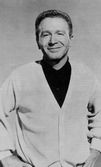Doing standup comedy in-the-round can be daunting. On Reddit, iamgarron had this advise about performing in-the-round:
"Yes. By far the biggest change is minimalizing 'act outs' and stuff that requires facial expressions. Walk slowly around to engage all the audience, stop for punchlines."
Woody Allen
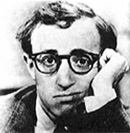
Woody Allen was born on December 1, 1935, as Allen Konigsberg, in Brooklyn, NY. As a young boy, he became intrigued with magic tricks and playing the clarinet, two hobbies that he continues today.
Allen broke into show business at 15 years when he started writing jokes for a local paper, receiving $200 a week. He later moved on to write jokes for talk shows but felt that his jokes were being wasted. His agents, Charles Joffe and Jack Rollins, convinced him to start doing stand-up and telling his own jokes. Reluctantly he agreed and, although he initially performed with such fear of the audience that he would cover his ears when they applauded his jokes, he eventually became very successful at stand-up. After performing on stage for a few years, he was approached to write a script for Warren Beatty to star in: What's New Pussycat (1965) and would also have a moderate role as a character in the film. During production, Woody gave himself more and better lines and left Beatty with less compelling dialogue. Beatty inevitably quit the project and was replaced by Peter Sellers, who demanded all the best lines and more screen-time.
It was from this experience that Woody realized that he could not work on a film without complete control over its production. Woody's theoretical directorial debut was in What's Up, Tiger Lily? (1966); a Japanese spy flick that he dubbed over with his own comedic dialogue about spies searching for the secret recipe for egg salad. His real directorial debut came the next year in the mockumentary Take the Money and Run (1969). He has written, directed and, more often than not, starred in about a film a year ever since, while simultaneously writing more than a dozen plays and several books of comedy. Although his stories and style have changed over the years, he is regarded as one of the best filmmakers of our time because of his views on art and his mastery of filmmaking.
Dick Gregory
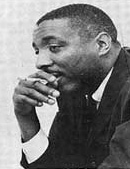
Richard "Dick" Claxton Gregory (October 12, 1932 - August 19, 2017), was a Comedian, a social activist, a writer and an entrepreneur.
As a child, his family fell into the "middle lower" class, financially. He was a track star in college, and spent two years in the U.S. Army. After his military service, he performed as a comedian in small, primarily black nightclubs. He worked for the U.S. Postal Service during the daytime. In 1961, he was hired by Hugh Hefner, to work with the Chicago Playboy Club. This is where he began to gather fame. He used the following line to wow an entirely white audience, prompting Hef to hire him:
Good evening ladies and gentlemen. I understand there are a good many southerners in the room tonight. I know the South very well. I spent twenty years there one night.
Last time I was down South I walked into this restaurant and this white waitress came up to me and said, "We don't serve colored people here." I said, That's all right. I don't eat colored people. Bring me a whole fried chicken."
Then these three white boys came up to me and said, "Boy, we're givin' you fair warnin'. Anything you do to that chicken, we're gonna do to you." So I put down my knife and fork, I picked up that chicken and I kissed it. Then I said, "Line up, Boys!"
Source: duckprods.com/
In a few years he was known nationally, appearing on television; his autobiography, Nigger was the best selling book in America, selling 7 million copies. He became more involved in struggles for civil rights, activism against the American War in Vietnam, economic reform, anti-drug issues, conspiracy theories, and others. As a part of his activism, he went on several hunger strikes.
Dick Gregory unsuccessfully ran for president of the United States in 1968 as a write-in candidate. He wrote Write Me In, about that political campaign. In recent years he has been a figure in the health food industry. Gregory married his wife, Lillian, in the 1960's, and they now have ten children. As of 2005, he resides in Plymouth, Massachusetts.
Source: answers.com/topic/dick-gregory
Jackie Kahane
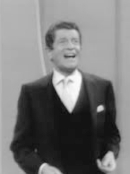
Jackie Kahane was a stand-up comedian, actor and writer who was born on 29 September 1921 in Montreal, Quebec. He was most notable for working with Elvis Presley from 1972 until his death in 1977, during which time he was once booed off the stage in Madison Square Garden due to the crowds impatience to see Presley perform. He is also known for featuring in Elvis on Tour (1972), and appearing numerous times on The David Frost Show, The Tonight Show with Johnny Carson, and The Ed Sullivan Show. In 1961, Kahane was selected along with Bill Cosby as one of Time magazine's outstanding comedians.
He wrote and delivered the eulogy at Elvis' funeral, and died after a lengthy battle with cancer on 26 March 2001 in Encino, California.
Jack E. Leonard
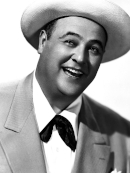
Leonard was born Leonard Lebitsky on April 24, 1910, in Chicago ("You know, the city where kids play robbers and robbers"), the son of a Jewish tailor. He claimed that one of his childhood friends was Baby Face Nelson. As a young man, he worked as a lifeguard ("I swam against Johnny Weissmuller ... and he was so fast I haven't seen him since"), and first worked professionally as a dancer, competing in Charleston contests. In the 1930s, he joined a vaudeville troupe, then began touring with the big bands, playing nightclubs all over the country. During World War II he toured bases with the United Service Organizations.
The Tonight Show, hosted by Jack Paar, marked his first national exposure. For the next several years he worked steadily in Las Vegas, and made hundreds of television appearances on various panel and variety shows. He made occasional recordings, and appeared in a handful of motion pictures, such as Three Sailors and a Girl.
Leonard's comedic method was sarcastic and aggressive, creating an "insult humor" genre which anticipated Don Rickles. (Leonard was roastmaster at the Friars' Club roast of Rickles, who he introduced as "a man who's been doing my act for about 12 years now.") A trademark line, after taking off his hat to reveal his bald head: "What did you expect, feathers?" He also referenced his weight problem in his act. Leonard's strong and unapologetic onstage personality ("Good evening, opponents!") belied a gentle and giving spirit that would occasionally be revealed in his act when he would sing a sentimental song.
He wore a distinctive outfit: a dark suit, purposely two sizes too small, a white narrow-brimmed hat, and horn-rimmed glasses. On one variety show, Leonard's contemporaneous popularity was demonstrated when a look-a-like came on stage and did a Leonard-like schtick. Then Leonard walked on stage and addressed his doppelgänger: "You've got a great future, son, but not in this business!"
In March 1973, he collapsed shortly after finishing a performance at the Rainbow Room in New York City and underwent emergency cardiac bypass surgery, but died several weeks later at the age of 63.
Jackie Mason
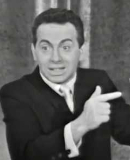
Jackie Mason (born Yacov Moshe Maza; June 9, 1931) is an American stand-up comedian and film and television actor. He is ranked No. 63 on Comedy Central's 100 greatest stand-up comedians of all-time. Known for his delivery and voice, as well as his use of innuendo and pun, Mason's often culturally grounded humor has been described as irreverent and sometimes politically incorrect.
He was a comedian at the Fieldston Hotel in Swan Lake, New York, in the summer of 1955. Mason was let go because his act was considered too far ahead of its time. He performed at New York City nightclubs and on The Steve Allen Show, his first national TV appearance, in 1962, and the Tonight Show with Steve Allen, as well as on The Perry Como Show, The Dean Martin Show, and The Gary Moore Show.
Mason made several appearances as a guest on The Ed Sullivan Show during the 1960s. In 1962 he came out with his initial LP record, a best-seller entitled I'm the Greatest Comedian in the World, Only Nobody Knows It Yet, followed by I Want to Leave You with the Words of a Great Comedian.
The Smothers Brothers
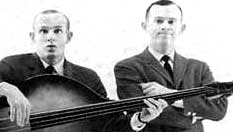
The Smothers Brothers are an American musical-comedy team, formed by real-life brothers Tom and Dick Smothers.
After a brief time in a folk group called the "Casual Quintet," the Smothers made their debut as a duo in 1959. They were a popular act in clubs and released several successful record albums.
The brothers' trademark act was performing folk songs (Tommy on acoustic guitar, Dick on stand-up bass), which usually led to fake arguments between the two siblings. Tommy's signature line was, "Mom always liked you best." Tommy (the elder of the two) acted 'slow,' and Dick acted 'superior.' In real life Tommy was not 'slow' at all: He handled their business affairs and later gained fame as a yo-yo expert, The Yo-Yo Man, even starring in his own special program on television.
The brothers appeared on numerous television shows in the mid-1960s and hosted two shows of their own, the situation comedy The Smothers Brothers Show (1965-1966), in which Tom played an angel come back to earth, and then the variety show The Smothers Brothers Comedy Hour in 1967.
The latter show became increasingly controversial for its references to youth culture, racism, and the Vietnam War, thus getting the comedians into regular conflicts with the network censors. The show also featured an impressive list of writers and regular performers who would eventually become some of the biggest names in comedy, like Pat Paulsen, Steve Martin, Don Novello, and Rob Reiner. CBS abruptly canceled the show on March 9, 1969, leading the brothers to file a successful breach of contract suit against the network. Despite the cancellation, the show went on to win the Emmy Award that year for best writing. The saga of the cancellation of the show is the subject of a 2002 documentary film, Smothered.
The Smothers Brothers had further shows: The Smothers Brothers Show (1975) and The Smothers Brothers Comedy Hour (1988-1989) and The Tom and Dick Smothers Brothers Specials I and II in 1980.
The Smothers Brothers operate the Remick Ridge Vineyards in Sonoma County, California and as late as 2004 continued to tour.
